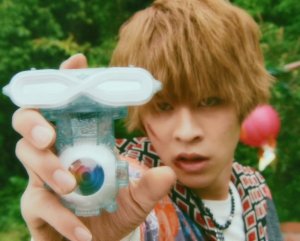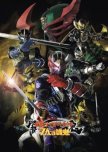
Replaces Hibiki's 2nd upgrade episodes well, but still a merely okay story.
*copied from my LB review*One of my KR hot takes is that Hibiki largely gets BETTER after the staff changes (though not without its faults). The character writing is more rigorous, they start to form more of an overarching plot, something larger with the Makamou and all, and it feels a lot more involved (plus I even kinda relate to the infamous, much derided Kyosuke Kiriya, though his resolution at the end of the series leaves something to be desired).
That said, one of the weakest parts of the back half of Hibiki was the two-parter that introduced Hibiki’s final form, it’s this story about some blowhard higher up Takeshi member who drops in and tests all the Oni to see who is capable of using the special sword, and when none of them are able to do it, and one of the supporting characters tell him that he modified the sword to a level that would be pretty much impossible to wield, he just arrogantly scoffs it off saying everyone is just unworthy and “not working hard enough”, so instead of him facing any repercussions to his ego, instead they just have it so Hibiki just trains hard enough to be able to use it while the guy’s ego remains pretty much unchanged, it’s pretty dumb.
This movie is meant as a bit of lore to the Oni and Makamou centuries ago, painting the Hibiki cast as descendants of these other Oni and villagers from the past, and it plays like a bit of a riff on Seven Samurai, gathering all the Oni to fend off some major Makamou and all while facing some wariness from the villagers thinking the Oni are cursed, bring destruction with them, etc, leading to a brief clash between the Oni about whether to protect the humans who are ungrateful to them or not in spite of their actions and all, but it doesn’t end up being anything major.
Then it leads into a few modest dramatic turns with one kinda decent twist, but the final battle cut away from to get to present Hibiki’s fight with a big Makamou, getting the Armored Hibiki form, etc and then cutting back to the resolution of the past story and all.
It’s serviceable which is an improvement on the egregious part of the TV series this serves as an alternate take on, so I’d take it over that, but the direction is more in line with the first half of Hibiki which I wasn’t as into, felt blasé and dull, especially since this more isolated story here isn’t meant to significantly add to the cast’s characterization and all, just a bit of lore and an inclusive dramatic story which just well, isn’t as dramatic and captivating as it could be, so I think it’s ultimately not as good as the TV series on the whole.
A good replacement to some of Hibiki’s worst episodes, with a callback to the first half’s style that fans of that portion of Hibiki are sure to love, but something I find a bit boring, just serviceable.
Was this review helpful to you?
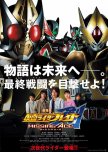
Messy but interesting Blade AU
*pulled from my LB review*Some of the editing choices give a nice storytelling economy, guiding more expositional and lax scenes along at some light-hearted, comedic rhythms, re-establishing the characters in this alternate route in a brisk and entertaining manner. That said, the editing for trying to fit the story in the short timeframe and all still has lots of subplots just breezed over, and some of its ideas brushed aside, just bit off way more than it could chew with the time allotted.
Kenzaki's feelings of missing purpose without fighting the Undead which he doesn't prepare to reconcile beyond the film credits after the temporary conflict OF the film will surely pass, Mutsuki's PTSD and confused inner feelings, Amane's pubescent angst at missing Hajime and the latter having no real time to directly communicate with her and all, showing up right towards the end and then being sealed shortly thereafter, Shiori's wedding, the villain's motivations, the rapidfire red herrings that have no staying power to affect, etc. All of this brought up and never given time to breathe or properly address, lots of potential in the story laid bare but no time to fulfill it, making a bit of a haphazard mess.
In spite of that however, I do respect the ambition, but this should've been at least a 2 hour movie, could've been quite good if it got ample time to flesh out, maybe some sort of Blade alternate timeline mini-series, because it does all seem intriguing, and the movie still managed to be some snappy fun at the end of the day, still not too bad.
If the Blade series generally dragged and recycled plot lines and drama, this film suffers the opposite of being too short & quick to satisfy the litany of character subplots it raises, though for Blade and general KR fans this may provide adequate surface level action pleasure.
Was this review helpful to you?
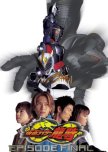
Kamen Rider Ryuki The Movie: Episode Final
0 people found this review helpful
Recommended supplement for Ryuki
*pulled from my LB review, broad, qualitative spoilers*TL;DR: Watch before Ryuki's last few episodes.
Miho's story makes the conflict with Asakura more urgent which was a nagging issue with the series, that a convicted murderer and psychopath was running around rampant and everyone was stewing around whether they should kill him or not since he's got the powers of a Rider behind him now or not to stoop to his level, break moral codes, yadda yadda. Of course, they are only at liberty to have her story in the first place because it's like a pseudo-alternate continuity, because Asakura would've been dealt with in series a lot sooner otherwise, and then the series wouldn't be nearly as long (or they'd have to find a way to draw out real, complex drama from more morally clean characters and find grey areas and hangups and such, *gasp* perish the thought!)
The questionable canon nature of this thing with Miho aside, this movie DOES reiterate and expand on Yui & Shiro's story a bit which is good, adds some details which would soften the blow and ease people into Ryuki's infamous ending even a little bit, so I think this should be required viewing while watching Ryuki, before the last few episodes this vaguely takes place in-between, though it would've been nice if this was incorporated into the TV run properly (also would've been nice if the series' ending didn't suck but alas).
The movie's own ending is a weird cliffhanger never resolved and meant to count as the loose ending to a different path of fate, so it's still not great on its own, but does reinforce the branching nature of the story and the TV series' ending decision with the other routes taken into account. Plus, as far as the endings to all the Ryuki timelines go, this is the least offensive oddly compared to the general futility of the 13 Riders special and Shinji's weird 180 at the very end of it, unable to even let a different route play to its conclusion as well as the TV series ending of course.
Ryuki is one of the hardest Rider series to recommend, though not necessarily one of the worst, ending aside, but if one felt so inclined to watch it, this is essential viewing before the final 5-odd episodes.
Was this review helpful to you?
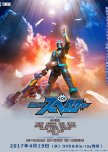
Kamen Rider Ghost RE:BIRTH: Kamen Rider Specter
0 people found this review helpful
This review may contain spoilers
Great supplement movie even Ghost haters will likely enjoy.
*Copied from my Letterboxd review.*Ghost is one of my top 5 Heisei Rider series despite all the pretty discernible flaws it has, one of which being Makoto's lackluster characterization, so I was curious to check this Makoto-centered film out to see if it could address that issue even a bit.
I'm happy to say it provided some of that (as best it could for a fixed hour-long V-Cinema runtime) and more on top of that.
One of the neater things about Ghost was how it created a two worlds setting, with the parallel (Ganma) world's politics touched upon (a bit loosely, but nice nonetheless) and the Ganma-native characters looking to be educated by, and bend, the politics of the "real" world, Alain observing humanity's errors as well as the Ganma world's own and trying to fix things. When Ghost wraps, it leans in to an optimistic light for Alain to be able to fix the Ganma world going forward even if we don't see it, but this movie provides more hard results and solid progress along with the troubles getting there.
The movie starts with Alain reflecting on the lives lost along the way to reach a new, hopeful trajectory, but his world is still ailing, people dying from the polluted skies, and he gets Akari, Igor and co to help him find a solution as he continues with minor remedies for some of the sick people in the meantime. People are growing impatient that the problem hasn't been fixed yet and doubtful of Alain's rule even as a relative to Adonis and Adel whose plans weren't able to fix things. In comes the new villain, Dantan, a formerly exiled engineer of sorts, a normal citizen otherwise, not from royalty, but also a different vocation and "radical" in a way with his ideas. He presents weird, alternative ideas from a weird, alternative perspective and plays to the unrest of the people as a demagogue when his true motives are corrupt, looking to turn people into his puppets, more expendable for his use and a "greater purpose".
How does Makoto play into this? In an interesting move, the film seems to direct the criticism about Makoto's hollow characterization in on itself, reflecting on his simplicity and lack of true ambitions and all. He turns out to be the master clone/puppet Dantan created among a sea of failed/in-progress Makoto & Kanon clones.
Dantan simultaneously downplays his agency given his nature while also exploiting Makoto's growing capacity for emotion and empathy as if leading him to naturally want to help his "creator" like a loved parental figure, though Makoto would be something of an exception to the homunculi of sorts Dantan wishes to create.
Makoto is lead to support Dantan, in turn, opposing Alain's ideals, believing Dantan's solution will work better, but guided by his pure desire for the Ganma world to be saved. Makoto turned on his good friend for the sake of his ideal, and then Dantan reveals his colder, manipulative side as things come to light - how he used similar words to the good-natured Ryu Tenkuji for (mostly) insidious ends, and Makoto sees his inhumanity, feels ashamed of harming Alain and being mislead in his noble pursuits, regretting his actions.
It is with this that Makoto reaches a self-awareness and evolves - his optimism is his own, his love for his sister is real to him, his betrayal and mistakes came about of his own will, as did his decision to change his course, now carrying on in atonement for his errors he made as a human, becoming Sin Specter. Makoto fights Dantan, who he still recognizes as one of his (multiple) father figures, and that his words have shaped him, but taking them to their purest root, arriving at his own conclusion in opposition to him and forging ahead.
The movie recontextualizes the loosely thrown about 'cogito ergo sum' philosophy throughout the series on free will into another thread, specific to Makoto, a man questioning his identity, feeling existential despair, disenfranchisement, and a new figure to support as a reflection of his values and substitute for his sense of self before coming to realizations himself, with some timely modern parallels.
Akari, Igor and the others' efforts to push forward with their own plans in spite of the meddling of Dantan and his prevailing worldview help to change things for the good, mostly in a roundabout, offscreen way, but clear enough, and the movie despite having some abridged structural notes given its more regimented format, still does quite well for itself. Takeru gets some time to NOT be in the spotlight and fight, instead encouraging another lost creation of Dantan's find a will to live, Alain starts to bring good change and hope to the Ganma World, and Makoto sets off with a renewed sense of self to still discover more of who he is, guided by the wills of his 3 father figures.
I think this is not just good for a Kamen Rider movie, but a pretty darn good movie in itself. While Makoto's development manifests in broader ways which don't entirely build on the nitty-gritty of his personality, his much improved agency and self-affirmation is greatly appreciated. Alain also gets a little more to him after stagnating a bit after his arc in Ghost, getting a new form for his boldest, most humane expressions of friendship in willing to confront Makoto in order to better help/save him is a nice further development from his more impersonal gestures and near apathy he started with in the series. Saionji's inclusion after being revived in the HBV is a bit odd and tacked on, but is still a nice note.
I had some concerns about the political representations between good & evil here at first (Alain from a monarch/nobility as good versus a normal citizen and general radical as evil) but the moral specifics won out and further illustrated the parallels better (Dantan using those people to heal himself as something expendable and selfish actions).
Politically charged, a bit introspective, and more of that strong emotional sensitivity seen throughout Ghost, it can't really stand on its own, but it's very good, I think it would even be appealing to people who don't like Ghost. Strongly recommended.
Was this review helpful to you?
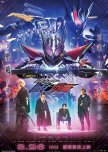
Zero-One Others: Kamen Rider MetsubouJinrai
0 people found this review helpful
This review may contain spoilers
A shockingly bleak Zero-One follow-up, quite exciting.
*pulled from my LB review*Adds more information on some of the lingering threads of Zero One, partly illuminating, partly further complicating the culpability of who is to blame for Ark, MetsubouJinrai, why Jin was originally revived, etc. Feels like a bit of a reiteration of some of the war profiteering stuff touched on in the series proper, but made a bit more succinct here (albeit after some convoluted explanations early on in the film).
Now it is better framed as a bigger, badder dude above Gai contributing to the creation of Ark which relieves Gai—a character with a somewhat muddied history and awkward redemption arc (or lack thereof)—of at least a bit more of the blame, as Lyon Arkland’s unrepentant megalomania makes him a much cleaner target for a lot of the bad stuff happening.
With this revived conflict too, it is now staged after MetsubouJinrai’s own turn to good at the end of the series, their continued attempts to make amends and fight off any emerging new Arks to save HumaGears and humanity both making them more noble and sympathetic, only for Lyon Arkland to drive in the self-doubt further in them, as if their existence being made to eradicate humanity can never be escaped from. And so, with that doubt and Lyon currently exploiting Sold type HumaGears for his war games, MBJR acts as a martyr to free the Sold types from Lyon’s control, fully becoming Kamen Rider MetsubouJinrai and overriding their control, embracing the Mass Brain system, and becoming a final clear evil themselves.
Alas, this ends on a cliffhanger, so I’d honestly advise any Zero One watchers to wait on the Valkyrie and Vulcan V-Cinema to come out first. That’s honestly the bigger concern than knowing the context of the film preceding this, RealXTime, which hasn’t been subbed yet.
Kinda familiar, some of the explanations are a bit convoluted, and the fights in this aren’t that great, mostly just some suited fisticuff brawls really, little in the way of weapons, elaborate choreo or many special attacks and such. Nonetheless, the added humanizing for the MetsubouJinrai gang, how the story and context adds on a palpable feeling of guilt and self-doubt and all the complications that arise from that along with making some of the war profiteering and complicated ZAIA threads a bit more clear is nice, not bad.
Also big props for all the Canadian representation - Jai West while a bit corny in some places, brings some of his welcome twisted charisma for a fun villain of this V-Cinema, and the Monkey Majik closing track is pretty sweet.
Was this review helpful to you?

